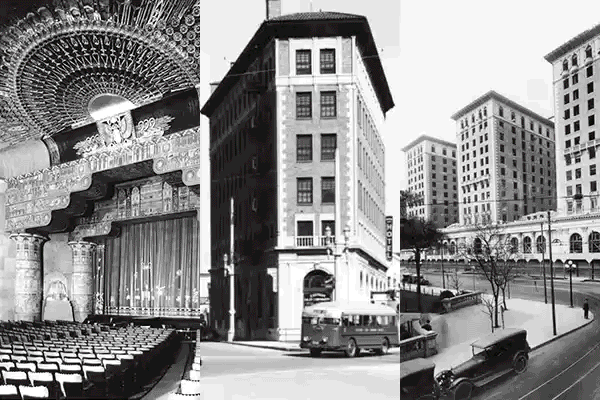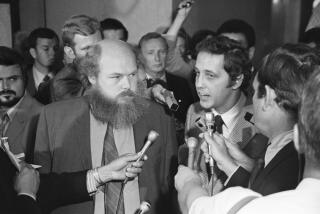It was the ‘Hoax’
- Share via
“I only wish I were still in the movie business.”
That’s Howard Hughes at his 1972 news conference, dialing in from the Bahamas to refute his purported autobiography, the one ostensibly written in conjunction with mythomaniac and Mailer-lite Clifford Irving, that McGraw-Hill had just ponied up a million bucks for and Time-Life planned to excerpt. “I don’t remember any script as wild. It is as stretching of the imagination as any yarn could turn out to be,” says Hughes, the implicit voice of reason.
Of course, things are rarely what they seem: Michael Drosnin’s “Citizen Hughes” (based on Hughes’ own memos) informs us that the naked billionaire had just shot up eight tabs of codeine and watched “Funeral in Berlin” three times in a row, in which a Soviet colonel threatens to defect to root out his former collaborators.
Hughes stays largely off screen as well in “The Hoax,” a new film directed by Lasse Hallstrom and starring Richard Gere, based on Irving’s account by the same name written just before the 16 months he spent in prison for fraud. And what might have seemed like damaged goods just a month ago (it began shooting in July 2005, has sat on the shelf for over a year, and is now set for an April 6 release) is now revealed to be a concise rumination on what James Jesus Angleton by way of T.S. Eliot called “a wilderness of mirrors.”
Among its explosive claims -- the movie, not the book -- is that Irving inadvertently inspired the Watergate break-in, which occurred on the exact day he was sentenced (a charge confirmed outright in “Citizen Hughes,” attributed to Nixon’s inflamed paranoia, and suggested in the H.R. Haldeman and John Dean memoirs), and that the entire affair was an elaborate chess match between giants who walk among us, with Irving the unknowing pawn.
“You’re interpreting history in a way, but through interpretation you find your own voice, and you wind up talking about the things you’re interested in,” says screenwriter William Wheeler. “I started to get really excited about this ‘Rosencrantz and Guildenstern’ view of history, where Clifford is sensing these larger forces that are so far beyond him.”
A playwright and product of the NYU theater program, Wheeler is a big, beefy intellectual in the newly minted William Monahan mold (the screenwriter of “The Departed” who name-checked Robert Bolt in his Oscar speech) -- as apt to cite Harold Bloom’s “The Anxiety of Influence” as the ‘70s film canon.
No stranger to unseen forces, his first produced script was the criminally under-seen “The Prime Gig,” a con-man movie that pits Ed Harris against Vince Vaughn in his most calibrated performance and suffered from a surfeit of Mamet comparisons -- not least of which were director Gregory Mosher, who originated 23 Mamet productions on the stage, and Mamet mainstay J.J. Johnston in a cameo (“You touch my car, I’m on the phone to the cops. You touch me, I’ll hit you with a stick.”). That film died on the vine at New Line when indie producer Cary Woods lost his financing, and it was dumped to DVD in 2001.
“We were asking strangers in the street to release that thing,” recalls Wheeler. “I really loved Cary, he was old-school -- ‘We’re gonna get this movie made!’ -- but I was hearing about the $30 million that was coming from Indian investors until the day they started taking the desks out of the offices.”
“Life is funny,” says Mosher in his only postmortem on the whole experience. “I don’t know how Bill got all this insight into the way these tricksters move through the world, but, boy, he sure figured it out, didn’t he?”
According to Wheeler, Irving is less than sanguine about the prospect of being on the wrong end of what is essentially an unauthorized biography. He was openly critical of the liberties taken in the script, such as relocating his home from the island of Ibiza, fudging the chronology of Truman Capote’s “Black and White Ball” or claiming that Irving met Hughes foreman Noah Dietrich in person rather than receiving his memoirs through an intermediary. He recently called the tone “goofy” in the New York Post.
“It depends on what day you catch him on,” says Wheeler. “I went to see him in Santa Fe, and while he was hospitable, he was also totally unreadable. The guy’s an operator -- and I say that with a certain amount of respect. He has that CIA agent-type quality, where he truly seems capable of anything. He told [producer] Josh Maurer the Hughes people had invited him to Nevada and left him alone in a room with incredibly damaging files on Nixon and other things. When I repeated all this, he said, ‘Oh, I don’t remember that.’ So the theme of the unreliable narrator has been my whole focus, because in some of these instances, I don’t know what’s true and what isn’t.”
More to Read
Only good movies
Get the Indie Focus newsletter, Mark Olsen's weekly guide to the world of cinema.
You may occasionally receive promotional content from the Los Angeles Times.










